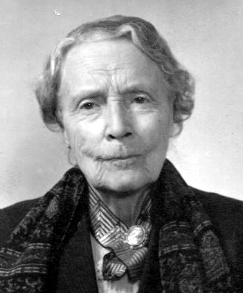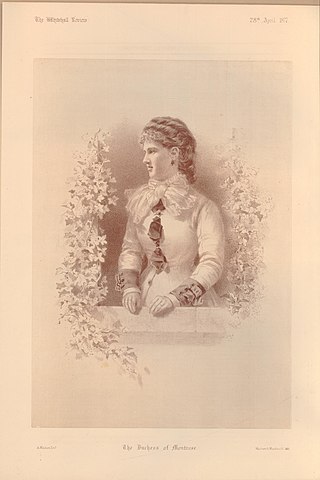
Kelvingrove Park is a public park located on the River Kelvin in the West End of the city of Glasgow, Scotland, containing the Kelvingrove Art Gallery and Museum.

Dame Sarah Elizabeth Siddons Mair was a Scottish campaigner for women's education and women's suffrage. She was active in the Edinburgh Association for the University Education of Women and the Ladies' Edinburgh Debating Society, which she founded before she was 20.

Dame Louisa Innes Lumsden was a Scottish pioneer of female education. Lumsden was one of the first five students Hitchen College, later Girton College, Cambridge in 1869 and one of the first three women to pass the Tripos exam in 1873. She returned as the first female resident and tutor to Girton in 1873. From 1877-82, Lumsden became the first Headmistress of St Leonards School, Fife, and first warden of University Hall, University of St Andrews which opened in 1896. She is credited with introducing lacrosse to St Leonards.

Anna Gillies Macdonald Munro was an active campaigner for temperance and the women's suffrage movement in the United Kingdom. Munro organised and was the secretary of the Women's Freedom League campaigning in Scotland. She settled in Thatcham after the First World War but was living in Aldermaston by 1933 and died in Padworth, Berkshire in 1962. She had affordable housing named after her in Thatcham.

Glasgow Women's Library is a public library, registered company and charity based in the Bridgeton area of Glasgow, Scotland. It is the only accredited museum dedicated to women's history and provides information relevant to women's culture and achievements. It tries to operate on feminist principles. The library was awarded Recognised Collection of National Significance to Scotland status in 2015, as the collection contains valuable resources pertaining to women and their lives. In 2018, it was shortlisted for Museum of the Year. The museum supplies and encourages training and education, as well as skill-sharing via volunteers and/or staff.

A suffragette was a member of an activist women's organisation in the early 20th century who, under the banner "Votes for Women", fought for the right to vote in public elections in the United Kingdom. The term refers in particular to members of the British Women's Social and Political Union (WSPU), a women-only movement founded in 1903 by Emmeline Pankhurst, which engaged in direct action and civil disobedience. In 1906, a reporter writing in the Daily Mail coined the term suffragette for the WSPU, derived from suffragist, in order to belittle the women advocating women's suffrage. The militants embraced the new name, even adopting it for use as the title of the newspaper published by the WSPU.

Helen Miller Fraser, later Moyes, was a Scottish suffragist, feminist, educationalist and Liberal Party politician who later emigrated to Australia.

Janie Allan was a Scottish activist and fundraiser for the suffragette movement of the early 20th century.
The United Suffragists was a women's suffrage movement in the United Kingdom.

Mary Elizabeth Phillips was an English suffragette, feminist and socialist. She was the longest prison serving suffragette. She worked for Christabel Pankhurst but was sacked; she then worked for Sylvia Pankhurst as Mary Pederson or Mary Paterson. In later life she supported women's and children's organisations.

The Glasgow and West of Scotland Association for Women’s Suffrage was an organisation involved in campaigning for women’s suffrage, based in Glasgow, with members from all over the west of Scotland.

Elizabeth "Dorothea" Chalmers Smithnée Lyness was a pioneer medical doctor and a militant Scottish suffragette. She was imprisoned for eight months for breaking and entering, and attempted arson, where she went on hunger strike.

The Tree of the Year competition is held in the United Kingdom in autumn each year by the Woodland Trust, a nationwide conservation charity. Nominated trees are shortlisted by a panel of experts, before going to public votes to select a tree of the year for each of the four constituent countries of the United Kingdom. The panel then selects one of these to become Britain's tree of the year and be nominated for the following year's European Tree of the Year. The competition has been run each year since 2014.
Jessie Cunningham Methven was a Scottish campaigner for women's suffrage. She was honorary secretary of the Edinburgh National Society for Women's Suffrage from the mid 1890s until 1906. She subsequently joined the more militant Women's Social and Political Union and described herself as an "independent socialist".

Violet Hermione Graham, Duchess of Montrose GBE was a British philanthropist and anti-suffragist. Graham served as president of the Scottish branch of the Women's National Anti-Suffrage League. Her husband was Douglas Graham, 5th Duke of Montrose.

Louie Cullen was a British suffragette and hunger striker who emigrated to Australia to continue her feminist activism. She was imprisoned for her activist work, and was awarded a Holloway brooch.

The Hunger Strike Medal was a silver medal awarded between August 1909 and 1914 to suffragette prisoners by the leadership of the Women's Social and Political Union (WSPU). During their imprisonment, they went on hunger strike while serving their sentences in the prisons of the United Kingdom for acts of militancy in their campaign for women's suffrage. Many women were force-fed and their individual medals were created to reflect this.

Women's suffrage was the seeking of the right of women to vote in elections. It was carried out by both men and women, it was a very elongated and gruelling campaign that went on for 86 years before the Representation of the People Act 1918 was introduced on 6 February 1918, which provided a few women with the right to vote.
Jessie Margaret Soga, LRAM was a Xhosa/Scottish contralto singer, music teacher and suffragist. She was described as the only black suffrage campaigner based in Scotland. Soga was a lead member of the Women's Freedom League in Glasgow and later joined the Women's Social and Political Union; but did not carry out militant activity, using her organisational skills and musical talent to raise funds.




















